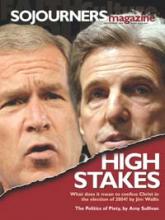Weve all seen the annual surveys of public trust in the professions. Every year, journalists, like politicians, slide a little closer to the bottom of the heap. Theres no mystery about journalism. Consider the recent story-fabrication scandals of Jayson Blair, Jim Kelly, and Stephen Glass. Think of Rick Bragg admitting he didnt go where he said he did. Remember CBS venerable Dan Rather apologizing because he and his crew didnt check out their sources. Few will doubt that journalism, like politics, is in crisis. But why?
A century ago, Joseph Pulitzer spoke eloquently of journalisms bottom line as the public good. Today, we might well ask how many journalists think of public good as the end purpose of their reporting. Certainly Blair, Kelly, and Glass werent thinking that way when they made up their stories. Perhaps Bragg wasnt either when he juggled being in two places at one time. Was Rather thinking of the public good when he rushed to air his story on questions about President Bushs National Guard service? The bottom line in each of these cases wasnt the public good, it was a calculated effectto get the story first, to make it colorful, to grab an audience.
Read the Full Article
